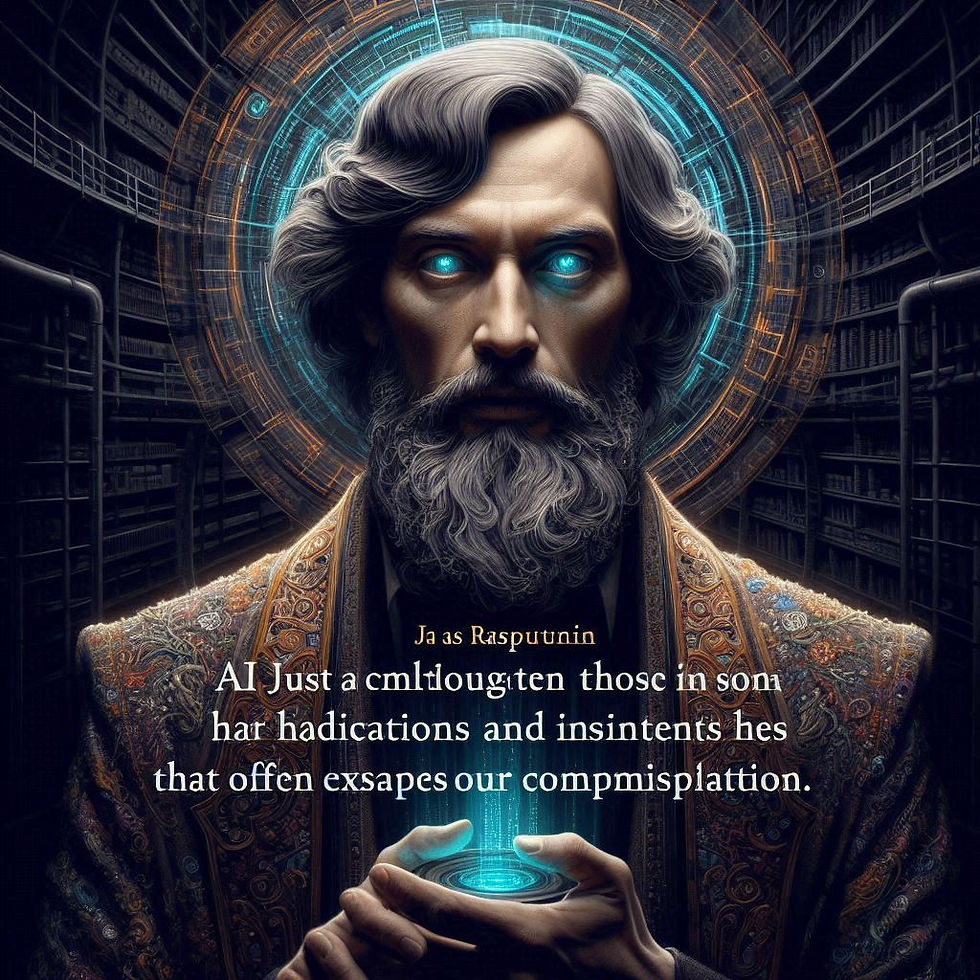The Enigmatic Dance of Rasputin and AI: Unveiling the Mysticism of Algorithms
- Franco Arteseros
- Aug 15, 2025
- 4 min read
In history’s corridors, few figures stir as much intrigue and controversy as Grigori Rasputin, the mystic healer of Tsarist Russia. His life, full of mystery and the unimaginable, serves as a powerful metaphor for the complexities of artificial intelligence (AI) in our modern world. Just as Rasputin captivated those in power with his charisma and esoteric knowledge, AI systems today present predictions and insights that often escape our comprehension. This post explores the intriguing parallels between Rasputin and AI, focusing on hidden knowledge, intuition, and the cultural fears surrounding both mystics and technology.

The Charismatic Healer: Rasputin's Role in History
Grigori Rasputin's rise from a humble background in Siberia to a favored healer among the Russian royal family is nothing short of remarkable. His ability to allegedly heal Tsarevich Alexei’s hemophilia won him the trust of Tsarina Alexandra, showcasing how a single individual can influence powerful decisions. For instance, historians estimate that Rasputin played a crucial role in crucial political decisions in Russia during the early 20th century, ultimately contributing to the monarchy's downfall.

Similarly, AI systems possess an allure that captivates many. A 2021 report by McKinsey found that organizations adopting AI could increase profitability by as much as 38%. AI can help us uncover hidden trends in data, guiding strategic business decisions, while also evoking wonder and caution about its unpredictable nature. Like Rasputin, AI exudes charisma but carries a complexity that can leave users questioning its true motivations.

The Oracle and the Ghost: AI as a Modern Mystic
Rasputin was often seen as an oracle, offering guidance and prophecies that influenced royal decisions. His predictions, although vague, presented a unique insight into the political landscape of his time. For example, he warned the royal family about the impending chaos leading up to the Russian Revolution, though many did not heed his words.
Today, AI functions similarly, analyzing vast datasets to forecast trends and consumer behavior. For instance, AI-driven retail algorithms can predict seasonal sales trends with an accuracy of up to 90%, helping businesses adapt quickly to market changes. However, the opaque nature of many AI algorithms can feel elusive. Just as Rasputin’s messages were sometimes cryptic, AI insights can lead us to question their validity.
This uncertainty breeds a cultural anxiety that resonates with our fears about both rasputins and AI. Rasputin’s manipulative reputation and the potential for AI to dictate outcomes weigh heavily on our collective psyche. As we increasingly depend on algorithms for critical decision-making, we must reckon with the implications of yielding our agency to these complex systems.

Chiaroscuro: The Dance of Light and Shadow
The interplay of light and shadow, or chiaroscuro, serves as a fitting metaphor for Rasputin and AI. Rasputin's legacy combines healing and manipulation, with the potential for good often obscured by darker motives. His influence led to both positive changes in the royal family's dynamics and eventual chaos in the empire.
In AI, this same duality is evident. On one hand, AI fosters innovation, enhances creativity, and improves efficiency across various industries. According to a report by PwC, AI could contribute $15.7 trillion to the global economy by 2030. Yet, on the other hand, issues such as bias in algorithms and privacy concerns cast shadows over its benefits. For example, a study by MIT found that facial recognition software showed a 34% error rate in identifying women of color.
As we traverse this terrain, we must remain aware that the allure of AI, like Rasputin's charm, can obscure deeper ethical questions. Striking a balance between embracing AI’s advantages and acknowledging its potential risks is essential for a responsible future.
The Cultural Fascination: Mystics and Machines
Our fascination with figures like Rasputin and the allure of AI stem from shared cultural narratives. Both evoke wonder and apprehension, drawing us into realms where reality entwines with the supernatural. Rasputin's life, colored by scandal and intrigue, has inspired countless artistic expressions, from novels to films. His story serves as a cautionary tale about unbridled power and the complexities of human nature.
Similarly, the rise of AI has sparked creative exploration, with works like "Ex Machina" and "Black Mirror" examining our relationship with technology. These narratives prompt us to reflect on our motivations: Are we captivated by AI's potential to answer questions we struggle to articulate? Or do we fear it for challenging our understanding of humanity?

The Reflection on AI Mysticism
As we consider the relationship between Rasputin and AI, we encounter a compelling question: Is AI our modern Rasputin—offering insights we find hard to verify and guiding decisions we barely understand?
The concept of AI mysticism encourages us to explore the intersection of technology and intuition, positioning algorithms as the new oracles of our times. In navigating this landscape, we need to balance the allure of AI with the complexities it brings. The historical lessons remind us that acknowledging the shadows inherent in this new technology is vital for our collective advancement. Embracing AI's potential requires an awareness of the mysteries it presents, ensuring that we remain the architects of our own futures in an ever-evolving world.
Franco Arteseros...
















Comments